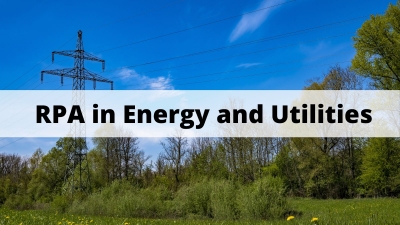Can RPA in utilities benefit the industry? If so, what are the RPA use cases in utilities? Let’s find out!
With changing regulatory compliances, rising customer expectations, and increasing infrastructure and maintenance costs, the utility industry is feeling the heat to become more dynamic, efficient, and data-driven. And RPA can help the utility industry achieve what it’s lacking.
As an industry replete with high-volume and transactional tasks, the utility space is one of the most compatible industries for implementing RPA. RPA in utilities can help increase customer satisfaction and boost capabilities by improving efficiency and reducing downtime.
Gartner reports that 90% of large organizations globally are predicted to adopt RPA in some form by 2022. The same report predicts RPA demand to grow more consistently due to the impact of COVID-19, as RPA will decrease the dependency on humans for routine processes.
Let’s have a look at some of the use cases of RPA in the utility industry:
Use Cases of RPA in Utilities
Accounts Processing
Accounting processes are repetitive, transactional, and error-prone. The regulatory standards, compliance requirements, tracking varying costs at generation, transmission, and distribution, make accounting processes in the utility industry a dreadful task to be carried out manually.
RPA can automate repetitive and time-consuming tasks like invoice data entry and approval. Keeping track of payment amount, deadlines, compliances, and resolving discrepancies in balance sheets can be streamlined through RPA in utilities. Using RPA to automate accounts payable can help the company save time and resources, thus enabling employees to be involved in more strategic work.
Data Analysis
From ensuring smooth customer service to managing finances, everything depends on the organization’s data analyzing capabilities. Processing and maintaining such enormous amounts of data in the utility sector is overwhelming and sometimes overlooked. RPA bots can easily collect and process massive amounts of data concerning customers’ buying preferences and tracking the efficiency of complicated internal processes.
RPA bots in utilities can be programmed to track and report the number of outstanding transactions, the average amount of time it took to process transactions, the frequency at which human intervention was required, etc. The company can use the data analysis to identify patterns, design plans that the customers would prefer, and improve overall operational efficiency. Companies can also leverage data analysis to streamline the entire process of utility supply chain management using RPA.
Streamlined Meter Reading
As we all know, the utility industry houses a vast customer base. This increases the probability of human error in validating meter readings of each household. This error in meter reading leads to incorrect bill generation, which, in turn, could hamper the company’s image.
RPA can help validate meter readings before the bill is generated. Software robots validate the reading and push it ahead for bill generation only if it’s correct. The reading is flagged for human review if there seems to be an error in it. This way, RPA facilitates streamlined meter reading, reducing employees’ need to be involved in such high-volume and error-prone transactional tasks.
Managing Outages
Companies in the utility industry have to be prepared for handling outages efficiently. Failure to do so can result in hefty fines for the organization and even put life and property at serious risk. RPA bots can help the organization in more efficient handling of outages. RPA bots can constantly monitor electrical systems and instantly alert the employees in case of any issue.
RPA can log into systems like GIS, SCADA, and existing outage management systems to detect and efficiently predict outages and outage locations. The problems detected early on with the help of RPA can help the organization in better decision making. Random outages can be avoided, and restorations can occur faster by eliminating human errors and better data reporting – all through RPA in utilities.
RPA in Utilities – Opportunities and Future
According to Grand View Research, the global market size of robotic process automation is projected to grow annually at a compound rate (CAGR) of 40.6% from 2020 to 2027. Prominent players in the utility industry have already started to implement RPA solutions to automate rules-based back-office processes.
It is essential to note that RPA does not require eliminating business process management systems to work efficiently. What makes RPA a popular stream of automation is its flexibility. RPA can be implemented along with your existing systems to suit your business processes.
With companies focusing on increasing productivity, there are structural shifts in the way people view routine jobs. As opposed to the general idea that RPA will replace humans, employees will continue to work alongside machines and software bots but on more strategic and decisive actions.
A well-established RPA CoE (Center of Excellence) is essential for organizations to effectively implement RPA while taking care of various tangents like planning at the organizational level, training the employees, prioritizing process governance, monitoring performance, and calculating the ROI of RPA implementation.
Final Words
Maruti Techlabs has worked with organizations to streamline processes and increase efficiency using RPA. As a top robotic process automation services company, we undertake a holistic approach by targeting the right processes, designing solutions that suit your business, providing far-reaching customer training, and setting up accurate expectations and goals.
If you like the article then follow Techdee for interesting articles.





